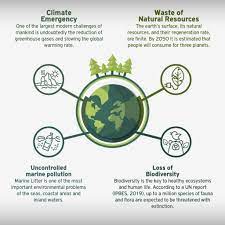The Importance of Sustainable Development
Sustainable development is a crucial concept that aims to meet the needs of the present without compromising the ability of future generations to meet their own needs. It involves finding a balance between economic growth, environmental protection, and social responsibility.
One of the key aspects of sustainable development is environmental conservation. By implementing practices that reduce waste, promote renewable energy sources, and protect natural habitats, we can ensure that our planet remains habitable for generations to come.
Furthermore, sustainable development also focuses on social equity and economic prosperity. It seeks to create opportunities for all individuals to thrive while ensuring that resources are distributed fairly and that vulnerable communities are supported.
Businesses play a significant role in promoting sustainable development by adopting green practices, investing in clean technologies, and supporting local communities. Governments also have a responsibility to enact policies that encourage sustainability and hold industries accountable for their environmental impact.
Ultimately, sustainable development is not just a goal but a necessity for the survival of our planet and future generations. By working together to implement sustainable practices in all aspects of life, we can create a more equitable, prosperous, and environmentally friendly world for all.
Seven Essential Tips for Embracing Sustainable Development Practices
- Reduce, reuse, and recycle to minimise waste
- Conserve energy by turning off lights and electronics when not in use
- Support local and sustainable businesses
- Use public transportation, walk, or cycle instead of driving alone
- Plant trees and support reforestation efforts
- Consume less meat and dairy to reduce your carbon footprint
- Educate yourself and others about the importance of sustainable development
Reduce, reuse, and recycle to minimise waste
Reducing, reusing, and recycling are essential practices in sustainable development that help minimise waste and promote environmental conservation. By reducing our consumption, reusing items whenever possible, and recycling materials to give them a new purpose, we can significantly decrease the amount of waste that ends up in landfills. These simple yet effective actions not only help preserve natural resources but also contribute to a healthier planet for future generations to enjoy.
Conserve energy by turning off lights and electronics when not in use
Conserving energy by turning off lights and electronics when not in use is a simple yet effective tip for promoting sustainable development. By being mindful of our energy consumption habits, we can significantly reduce our carbon footprint and contribute to environmental conservation efforts. Small actions like switching off lights and unplugging devices not only help lower electricity bills but also play a part in mitigating climate change. Embracing this practice as a daily habit can make a meaningful difference in preserving our planet for future generations.
Support local and sustainable businesses
Supporting local and sustainable businesses is a powerful way to contribute to sustainable development. By choosing to buy from businesses that prioritise ethical and environmentally-friendly practices, we can help reduce carbon emissions, support the local economy, and promote responsible production methods. These businesses often have a smaller ecological footprint and are more likely to invest in their communities, creating a ripple effect of positive impact on both the environment and society. Making conscious choices to support such enterprises can play a significant role in building a more sustainable future for all.
Use public transportation, walk, or cycle instead of driving alone
Encouraging the use of public transportation, walking, or cycling instead of driving alone is a simple yet effective tip for promoting sustainable development. By opting for these alternative modes of transport, individuals can reduce their carbon footprint, alleviate traffic congestion, and improve air quality in urban areas. Embracing these eco-friendly options not only helps to conserve energy and reduce greenhouse gas emissions but also promotes a healthier lifestyle by incorporating physical activity into daily routines. Making small changes in transportation habits can have a significant impact on building a more sustainable future for our planet.
Plant trees and support reforestation efforts
Supporting reforestation efforts by planting trees is a simple yet impactful way to contribute to sustainable development. Trees play a crucial role in combating climate change by absorbing carbon dioxide, improving air quality, and providing habitats for wildlife. By actively participating in tree-planting initiatives, individuals and communities can help restore ecosystems, conserve biodiversity, and create a greener environment for future generations to enjoy. This proactive approach not only benefits the planet but also promotes a sense of environmental stewardship and responsibility among people worldwide.
Consume less meat and dairy to reduce your carbon footprint
By consuming less meat and dairy products, individuals can significantly reduce their carbon footprint and contribute to sustainable development. The livestock industry is a major contributor to greenhouse gas emissions, deforestation, and water pollution. By opting for plant-based alternatives and reducing meat and dairy consumption, we can help mitigate the environmental impact of food production. Making conscious choices about our diet not only benefits the planet but also promotes healthier lifestyles and supports ethical farming practices.
Educate yourself and others about the importance of sustainable development
Understanding the significance of sustainable development is key to creating a more environmentally conscious and equitable society. By educating ourselves and spreading awareness about the importance of sustainable practices, we empower individuals and communities to make informed decisions that positively impact the environment and future generations. Through knowledge-sharing and advocacy, we can inspire collective action towards building a more sustainable world for all.

